NEW DELHI: The Supreme Court on Friday agreed to hear a plea seeking directions to the Election Commission of India (ECI) to frame rules for the registration and regulation of political parties with the aim of promoting secularism, transparency, and political justice.
A bench of Justices Surya Kant and Joymalya Bagchi issued notices to the Centre, the ECI, and the Law Commission of India on the petition filed by advocate Ashwini Kumar Upadhyay, who appeared in person.
While allowing the notice, Justice Kant observed that no political party had been impleaded as a respondent. “They will say you are seeking to regulate them without giving them an opportunity to be heard,” the bench told Upadhyay, directing him to include all national parties registered with the poll body.
Upadhyay’s petition alleged that “bogus political parties” posed a grave threat to democracy by appointing criminals, kidnappers, drug smugglers, and money launderers as office bearers in return for large sums of money. The plea also claimed that some separatists had floated parties solely to collect donations, with a few leaders even securing police protection.
Citing a recent media report, the petition highlighted how the Income Tax Department uncovered a “fake” political party that was allegedly converting black money into white by charging a 20% commission.
“Transparency and accountability in the functioning of political parties is crucial as they perform a public function. The ECI must therefore frame rules and regulations for them,” the plea, filed through lawyer Ashwani Kumar Dubey, argued.
The petition further noted that the apex court has previously initiated reforms to promote transparency and probity in public life. It contended that regulating political parties within the constitutional framework would strengthen democratic functioning.
Alternatively, the plea requested the Law Commission of India to study best practices from developed democracies and prepare a comprehensive report on political party regulation to curb corruption and criminalisation in politics.













